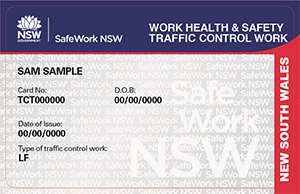Traffic Control Work Training
Traffic control work is defined in the WHS Act as:
- Traffic controller (TCR) – direct traffic in accordance with a work zone traffic management plan
- Implement traffic control plans (IMP) – implement a work zone traffic management plan in the immediate vicinity of a workplace
- Prepare a work zone traffic management plan (PWZ) – design (including vary) or inspect a work zone traffic management plan
- Visit Verify.licence to look up and verify NSW Traffic Control work cards.
If you do any of this work you'll need a training card

Workers will need a SafeWork NSW Traffic Control Work Training Card if they work in traffic control.
These cards will be mandatory for any worker conducting traffic control work on or adjacent to public roads in NSW.
Students who have completed training and hold a valid Statement of Completion (SOC) are able to carry out supervised work until they complete their final assessment.
Once your final assessment is successfully completed you will be issued with a SafeWork NSW Traffic Control Training Card.
Are there exceptions?
School crossing supervisors, heavy vehicle inspectors, emergency services personnel, defence and commonwealth employees do not need one of these cards.
Common situations
Where can I get a copy of the Transport for NSW Traffic Control at Worksites (TCAWS) Technical Manual?
The current version of the Traffic Control at Worksites (TCAWS) Technical Manual is available for download on the Transport for NSW website.
You work in traffic control and don’t have a card, what do you need to do?
You will need to enrol to undertake training and assessment with a SafeWork NSW Registered Training Organisation.
Recognition of Prior Learning will be permitted on the training component of the Units of Competency. The assessment will still need to be undertaken in full as normal for all individuals.
I don't work in traffic control but have been told I need to obtain a SafeWork NSW Traffic Control Work Training (TCWT) Card, what do I need to do?
On 1 July 2020, Traffic Control Work Training became part of the Work Health and Safety Act and the inclusion will made completion of training a legislated obligation.
This means that workers in varying industries such as manufacturing, retail and construction will now be required to obtain a TCWT.
For example : A supermarket with a loading dock that is accessed via a public road. The supermarket worker will be required to hold a TCWT card to be able to direct traffic to allow the truck to reverse into the loading dock.
For example : a worker may be required to hold a TCWT on a construction site where vehicles / trucks are accessing via a public road and traffic is needed to be stopped to allow vehicles in and out of the site.
Training and assessment must be undertaken with a SafeWork NSW Authorised Registered Training Organisation.
You need to replace your current card due to loss or damage or change your details.
Your Safework NSW Traffic Control Work Training Card can be replaced online.
If you card contains errors, contact 13 10 50.
You are a Business (PCBU) - what do you need to know and do from 1 July 2020?
- A PCBU has a duty to ensure that a worker holds a SafeWork NSW traffic control work training card.
- A penalty of up to $21,420 may apply to a business who directs a worker to undertake traffic control work without the required certification.
- The PCBU also needs to ensure that the worker has:
a) successfully completed the training for that type of traffic control work and
b) carried out that type of traffic control work in the preceding 2 years. - A business may direct a worker to undertake traffic control work while they are waiting for their SafeWork NSW Traffic Control Work Training Card to be issued. The worker must be able to show their Statement of Completion and confirmation letter of successful assessment upon request.
- A business may direct or allow a worker to carry out traffic control work if the worker has completed training but is yet to complete the workplace assessment and holds a current Statement of Completion (or letter of extension). The work needs to be carried out under supervision.
Working interstate
The Automatic Mutual Recognition (AMR) scheme makes it is easier and more affordable for many licensed or registered people to work in other states and territories with a single licence.
Traffic control work is included in the AMR scheme. This means licensed workers from all states and territories can work across borders (except Queensland), without having to apply for a licence in the second state or territory.
To be eligible for AMR the licence must be issued from the Government Licensing Regulator. NSW cannot accept Victorian training as issued by a Registered Training Organisation.
Interstate licensees must have a current licence in their home state and will need to notify us of their intention to work here by completing an online notification. This can be accessed at the NSW Government website.
Under AMR:
- licensees working interstate are subject to all relevant laws in the second state or territory
- their home state licence is considered a local licence in the second state or territory
- the second state or territory cannot impose specific conditions on an interstate licensee if they are not conditions that would be imposed on a local licensee
- any conditions on a licensee’s home state licence still apply while working in the second state or territory
- licensees may appear on the second state’s public register - this depends on the state or territory.
The scheme does not apply to New Zealand occupational registrations and licences.
Get trained
Further information
- RTOs sign in to manage courses including notification of training and payment of fees
- SafeWork NSW on 13 10 50 or email licensing@safework.nsw.gov.au